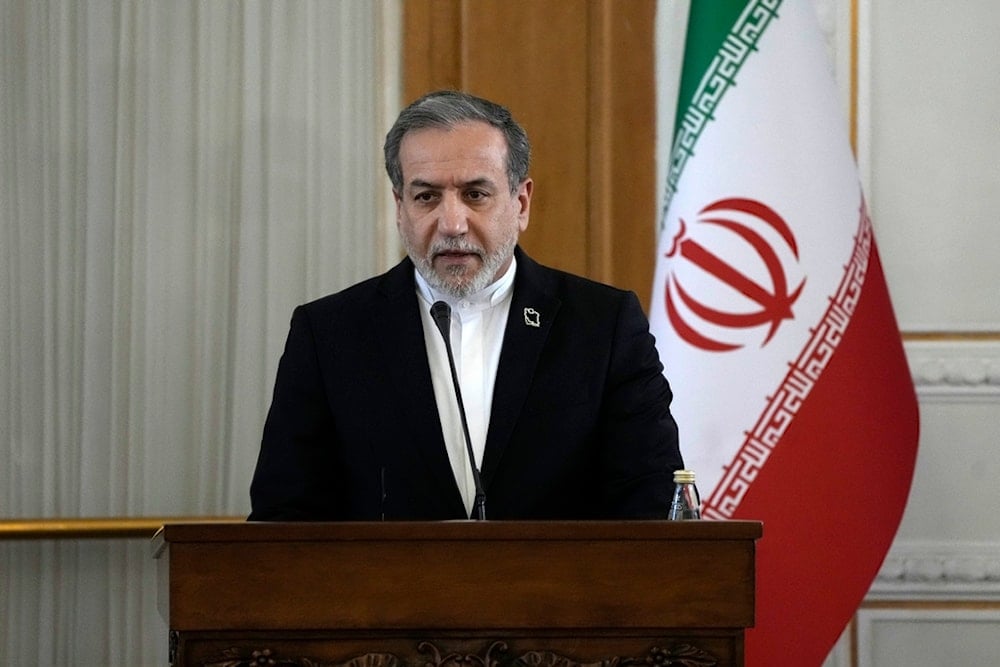Iran reaffirms stance as Araghchi heads to Oman for 4th round of talks
Iran’s Foreign Minister Abbas Araghci criticizes US inconsistency as indirect nuclear talks are set to resume in Oman, reaffirming his country's principled stance and peaceful program.
-

Iranian Foreign Minister Abbas Araghchi speaks in a joint press briefing with his Omani counterpart Sayyid Badr Albusaidi after their meeting in Tehran, Iran, Monday, Dec. 30, 2024 (AP)
The fourth round of indirect nuclear talks between Iran and the United States will kick off in the Omani capital, Muscat, on Sunday at noon, Iran's Tasnim News Agency reported, citing an informed source.
Under Omani mediation, Iran and the US held three rounds of talks in Muscat and Rome on April 12, 19, and 26 to reach a deal on Iran’s nuclear program and the lifting of Washington's crippling sanctions on Tehran.
Delegations from the two countries are led by Iranian Foreign Minister Abbas Araghchi and US President Donald Trump's Special Envoy Steve Witkoff.
This round of talks comes after a pause in diplomatic engagement, following recent developments regarding Iran’s nuclear file and Western positions.
The fourth round of talks was initially scheduled for May 3 in Rome. However, it was postponed.
Iranian sources told Al Mayadeen that the postponement came in light of the conflicting positions taken by the US administration regarding the talks.
They added that the postponement was due to Washington’s attempt to alter the general framework of the talks, which had been previously agreed upon.
The announcement came shortly after the US imposed new sanctions on entities accused of participating in the illicit trade of Iranian oil and petrochemicals.
Tehran hopes to reach 'determining point' in 4th round of talks
Araghchi stated Sunday that Iran remains firmly committed to its principled positions ahead of the fourth round of indirect Iran-US nuclear talks.
"Following my recent trip to the region and consultations with Saudi Arabia and Qatar, I am now heading to Oman. We had additional consultations this morning in Tehran, and we hope to reach a determining point in this round," he said.
Read more: Iran says US admits it has no nuclear weapons ahead of new talks
Araghchi blasts US for contradictory messaging
The top Iranian diplomat criticized Washington for what he described as inconsistencies in its statements and behavior.
"Unfortunately, we hear many contradictory statements from the other side. There are inconsistencies in both their interviews and the positions they adopt. Their stance during negotiations differs from what they express outside the talks, and this is one of the key problems in the negotiation process," Araghchi pointed out.
"In contrast to the other party," Araghchi added, "the Islamic Republic of Iran has well-known positions grounded in principles. We have moved along a straight path, and our positions are entirely clear."
Iran maintains peaceful, lawful nuclear program
The Iranian Foreign Minister also reaffirmed his country's commitment to a nuclear program based on legal and peaceful foundations, underlining the role of the International Atomic Energy Agency (IAEA) in monitoring all nuclear activities.
"Iran’s nuclear program is built upon strong legal and lawful foundations. All of its aspects are peaceful, and it has always been and will remain under the supervision of the International Atomic Energy Agency (IAEA)," he said.
"This is a right of the Iranian people that is neither up for negotiation nor compromise."
Iran's uranium enrichment main obstacle in talks
In a related context, Al Mayadeen's envoy to Muscat quoted a source in the delegation engaging in the nuclear talks as saying that Iran is ready to reassure all parties that its nuclear program will remain peaceful.
However, the source warned that Iran would not continue the talks "if we see that the other party deviates from the agreed-upon frameworks."
Al Mayadeen's envoy also noted that the process of uranium enrichment is the main obstacle in the talks US-Iran talks.
Renewed diplomacy
Since April 12, Tehran and Washington have engaged in three rounds of dialogue, the most significant contact on the nuclear issue since Trump’s 2018 withdrawal from the Joint Comprehensive Plan of Action (JCPOA).
These recent talks were initiated after Trump sent a letter to Iran’s Leader Sayyed Ali Khamenei, in March, calling for renewed discussions while simultaneously warning of potential military action if diplomacy did not succeed.
The tension surrounding Iran’s nuclear program has intensified since the US exit from the JCPOA, which had provided Tehran with sanctions relief in exchange for limiting its nuclear activities.
Iran remained in compliance for a year following the withdrawal but gradually began scaling back its commitments. Western governments have accused Iran of attempting to develop nuclear weapons, an allegation Tehran firmly rejects. Iran has confirmed over and over again that the country’s nuclear program is strictly for peaceful, civilian purposes.
Read more: Witkoff says JCPOA deal off the table, but broader Iran talks possible

 5 Min Read
5 Min Read










